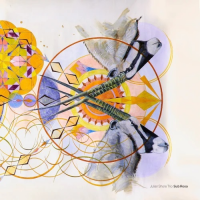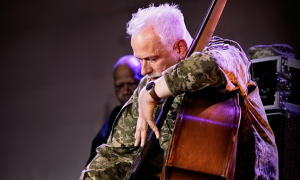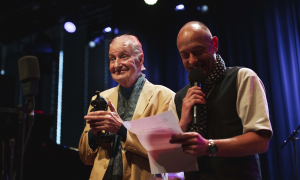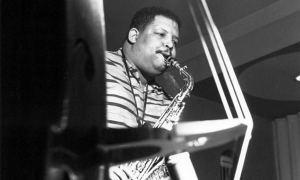Home » Jazz Articles » Profile » Cotton Pickin' Blues
Cotton Pickin' Blues

"Slabe wuk till daak on Sattidy jest lak any udder day but on Sunday slabe dont wuk en can visit back and fort on de plantations. I wuk in field on Maussa Johnnie Fripp plantation. Sometime we sing wen us wuk. One song been go lak dis
"Go way Ole Man, Go way Ole Man / Were you bin all day / If you treat me good I stay Till de judgment day / But if you treat me bad I sho' to run away."
On Sattiday night ebery slabe dat wuks gits a peck ob corn and pea sometime meat and clabber [soured cream]. You hab straw in your matress but dey gib you blanket. Ebery year in de Christmas month you gits four eider fibe yaard cloth 'cording to how you is. Out ob dat you haffa mek you clote [clothes]. You wears dat same clote till de next year. You wears hit winter en summer. You dont git no coat but dey gib you shoe. If slabe don't do tas [task] dey git licking wid lash on naked back. I see plenty sell on banjo table. Dey put you up on flatform en dey sell you. I see my uncle sell he brung one hunred dollar."
Source: Library of Congress
The poignancy of those words speaks loud. Loud too is the rhyming poetry in the song learned in an ante bellum time when Mr. Polite was old enough to work in the cotton fields. The cadence of poetry added rhythmic power to the work songs and made the words easier to learn by rote. Poetry is often in rural music but this was in a language that was neither truly English or West African. In the coastal Carolinas and Georgia it was Gullah—an Anglo-African dialect derived from the Gula ethnic group in America. They originated in the borderland between Liberia and Sierra Leone. Gullah is now officially recognized as a language.
The blues music genre is American. The word blues derives from an Old English expression blue devils, used to describe figures seen in hallucinations during alcohol withdrawal. The music comes from the African experience in America which Mr. Polite recounted so vividly. Early rural blues was not recorded nor heard on the radio, those did not exist then, neither was the music written down. It was music learned and sung in the fields in the same oral tradition as storytelling.
For entertainment, the songs were accompanied by the simplest of household items turned into makeshift instruments, a washboard made percussion, a wooden box and broom handle with a string, the bass. A store bought harmonica and a homemade guitar were added, sometimes with only one string. They played gliding the neck of a bottle or a knife along the string. The musicians were not paid, there was little or no money among the enslaved people unless it came from the plantation owner in payment for a hog raised behind their shack, as Mr Polite attested.
"You kin sell aig [egg} and chicken to store and Maussa will buy your hawg. In dat way slabe kin hab money for buy ting lak fish and watebber he want. We dont get much fish in slabery cos we nebber hab boat. You kin ketch possum and racoon wid your dawg."
Work songs are an African tradition. One man calls the first line, the others respond together. Early rural Blues opened with four lines of lyric the same, which later reduced to two repeated lines. Work songs gave a shared rhythm and purpose, a sense of team effort to complete tasks.
"Sometime one tas [a quarter acre] sometime two tas and sometime tree. You haf for wuk till tas tru. Wen cotton done mek you hab odder tas. Haffa cut cord ob maash grass meybe [spartina marsh grass].
Mr. Polite records that slaves worshiped together with owners on Sundays in Prayers or Praise Houses and brought their music in from the fields to church, where it was adapted for religious teaching using repetitive lyrics. A spiritual style evolved based on church teachings mixed with expressions of hope, and aspirations like" I'm Going to Walk in Jerusalem, Just Like John" and "Swing Low Sweet Chariot."
Mr Polite: "In Slabery we go to white folks chuch. Slabe dont know nuttin bout baptising. Wen slabe dead you cant knock off wuk for berry um. You haffa wait till night time for put um in de grabe."
When a string is tuned above its classical pitch, the sound it makes becomes brighter and livelier. When a string is tuned slightly below pitch, it becomes flat, a morose, sad sound. Lower-tuned blue or worried notes were slurred between major and minor, shaken and bent to add effect. In a piano there are naturally occurring blue notes to keep sound spacing regular. A heavy walking bass line was a key element of blues, which they called the groove. Blue notes were sung to give emotional expression, instruments were pushed beyond their design limits, seeking the sounds of human anguish and joy. The African American diaspora carried blue notes to Chicago, St. Louis, Memphis, Kansas City and everywhere they went in search of work and equality in the hundred years between Emancipation and Civil rights legislation.
Mr Polite: Wen gun shoot on Bay Pint for Freedom I been sebenteen year old wuking slabe.

W.C. Handy
arranger1873 - 1958
"I hate to see that evening sun go down —A lyric / I hate to see that evening sun go down —A repeated/ 'Cause my baby, he's gone left this town."---B reason or response
St. Louis Blues-W.C. Handy, (music written 1909, published 1914). The definitive recording of "St. Louis Blues" (Columbia, 1925) came from

Bessie Smith
vocals1894 - 1937

Louis Armstrong
trumpet and vocals1901 - 1971
Handy was styled the "Father of the Blues." Such hyperbole was common in the early days of marketing. There were Kings and Queens and a selection of aristocracy dotted through the ranks of songwriters and musicians both in jazz and blues. The blues had many fathers in the cotton fields and on the front porches of shacks in the South, stretching back in time. Enslavement meant no travel but the people were traded to other plantations, an inheritance meant an acreage of land and the slaves to work it. So work songs spread out through The South, nobody knows how many years they were passed down through the generations but they came to light in the 1800's.
Mr Polite: "Slabe dont marry dey jest lib togedder. All slabe haf for stay on plantation in day time but wen wuk done kin wisit wife on odder plantation, hab pass so Patrol wont get um. My fadder b'long to Mister Marion Fripp and my mudder b'long to mister Old B Fripp. I sont know how mucher land neider how much slabe he hab but he hab 2 big plantation and many slabe-more'n a hunred slabe."
W.C.Handy was responsible for first publishing music using the 12-Bar blues chord progression around 1902. That structure remains the basis of much of modern music today. Listen below to a typical 12-bar blues by Wille Mae "

Big Mama Thornton
vocals1926 - 1984
The blues work songs included call and response, which is also important in the conversation of jazz. W.C. Handy's "The Memphis Blues" was a rewrite of a song promoting a politician, Mr. Crump, recorded by the Victor Military band (Victor# 17619, 10" 78 rpm, 1914) a vocal recording followed. W.C Handy described it as a Southern Rag but it was more a jaunty Cakewalk, where traditionally, people paraded dressed to parody white folks sartorial finery, and win a cake as a prize. Confusingly, blues became a sales word. The word blues was used in titles whether the tune was blues, jazz, ragtime or neither. When Nick La Rocca's all-white Original Dixieland Jass band made the first jazz recording in 1917, the song was titled "Livery Stable Blues."
Actress

Mamie Smith
vocals1883 - 1946

Ma Rainey
vocals1886 - 1939
To synchronize time lines, blues was roaring at the same time as jazz in the 1920's. It was not uncommon then, nor today for jazz musicians to include a blues in their set list. City blues sung by ladies developed commercially perhaps three years later than jazz, even though its earliest rural roots began back in the mists of time. In contrast, jazz was an almost immediate amalgam of city based music styles and cultures. Electric blues began with the invention of the electric guitar in 1937 to give blues its full voice. By then, jazz had moved on to orchestral Big Bands and Swing.
The Mississippi Delta is a flood-plain, inland and upriver from New Orleans. It runs from Interstate 10, two hundred miles North to Memphis and includes some of the most fertile land anywhere. In 1890, a majority of the Mississippi Delta was owned and farmed by free African Americans funded by proceeds from logging out the land. State legislation, bank control of credit and overwhelming oppression forced African American farmers to forfeit their land and to work for a share of the crop yield. Their choices were dirt poor sharecropping or well paid work in factories in the North. Through the 1920's, many left the land to join the migration North. Blues musicians followed the same route as jazzmen had taken out of New Orleans from 1917. Blues left its rural home and came out into the city light. There were still deeply held Hoodoo magic and superstition beliefs in the country background of blues. Mississippi Delta blues musician

Son House
guitar, slide1902 - 1988
Charley Patton
guitar1891 - 1934
Legend says Johnson went to the crossroads to learn guitar from the Devil. They played on street corners for tips, and in Juke Joints for a fee. Juke joints were makeshift African American dance and gambling roadhouses fueled by illegal moonshine. The audience wanted a loud and lively dance tempo in their music. In search of louder sounds for performance and recording, musicians changed flat tops for arch top guitars. It was not until 1937 that electric pick-up patents were filed for the Rickenbacker Frying Pan, the first electric guitar. That led to Electric Blues, featuring the music of childhood Texan friends,

Blind Lemon Jefferson
vocals1883 - 1929

T-Bone Walker
guitar, electric1910 - 1975

Muddy Waters
guitar1915 - 1983

Little Walter
harmonica1930 - 1968

B.B. King
guitar, electric1925 - 2015
Boogie Woogie derives from the West African verb Bogi, meaning to dance.

Jelly Roll Morton
piano1890 - 1941

Lead Belly
guitar and vocals1888 - 1949
Orchestral music too included blue notes, and not just in pseudo Pops performances. Samuel Barber's "Adagio for Strings" from 1936, may be the most deeply sad music, a dirge struggling to surface as a completed crescendo before dying, defeated.

George Gershwin
composer / conductor1898 - 1937
The influence of the blues genre can be heard across a wide spectrum of American music, not just jazz and direct derivations of blues. It appears in Appalachian hillbilly, Country, and Western country music, which later coalesced into Country. Each of the styles which make up blues derived music has diversified and developed separately. Blues is in jazz, as the walking bass line groove and the blue notes, and it is in popular music in the 12-bar blues progression. Recognizing a cohesive link running through American blues music from its earliest roots in the mid 17th century , three hundred seventy years ago—before America was even founded—identifies the single deepest cultural and artistic endeavor in American history.
American blues is a genre born in the dirt of the cotton fields, which changed music across the world.
Photo Credit: Sam Polite mending fishing net, St Helena Island, SC. courtesy Smithsonian Institute
Tags
Blues Deluxe
Martin McFie
United States
South Carolina
W. C. Handy
Bessie Smith
Louis Armstrong
Big Mama Thornton
Mamie Smith
Ma Rainey
New Orleans
Memphis
Son House
Charley Patton
Willie Lee Brown
Robert Johnson
Blind Lemon Jefferson
T-Bone Walker
Muddy Waters
John Lee-Hooker
Little Walter
B.B. King
Jelly Roll Morton
"Leadbelly" Ledbetter
Comments
PREVIOUS / NEXT
Support All About Jazz
 All About Jazz has been a pillar of jazz since 1995, championing it as an art form and, more importantly, supporting the musicians who make it. Our enduring commitment has made "AAJ" one of the most culturally important websites of its kind, read by hundreds of thousands of fans, musicians and industry figures every month.
All About Jazz has been a pillar of jazz since 1995, championing it as an art form and, more importantly, supporting the musicians who make it. Our enduring commitment has made "AAJ" one of the most culturally important websites of its kind, read by hundreds of thousands of fans, musicians and industry figures every month.



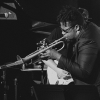



 Buy Now
Buy Now


